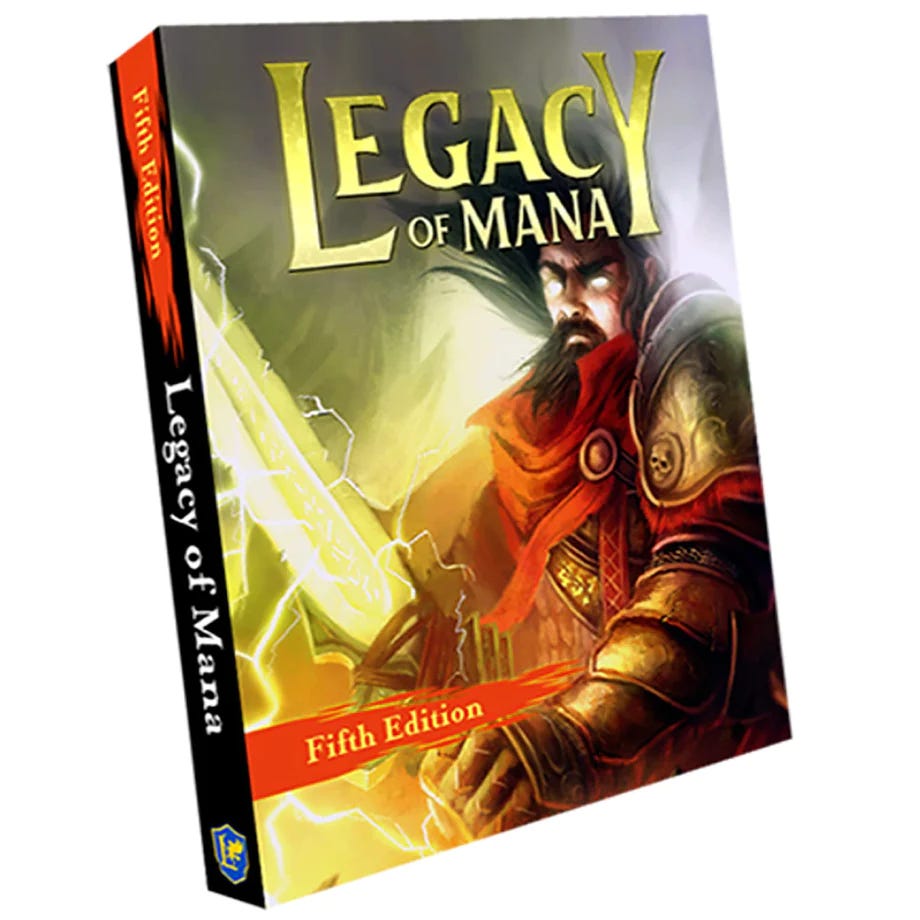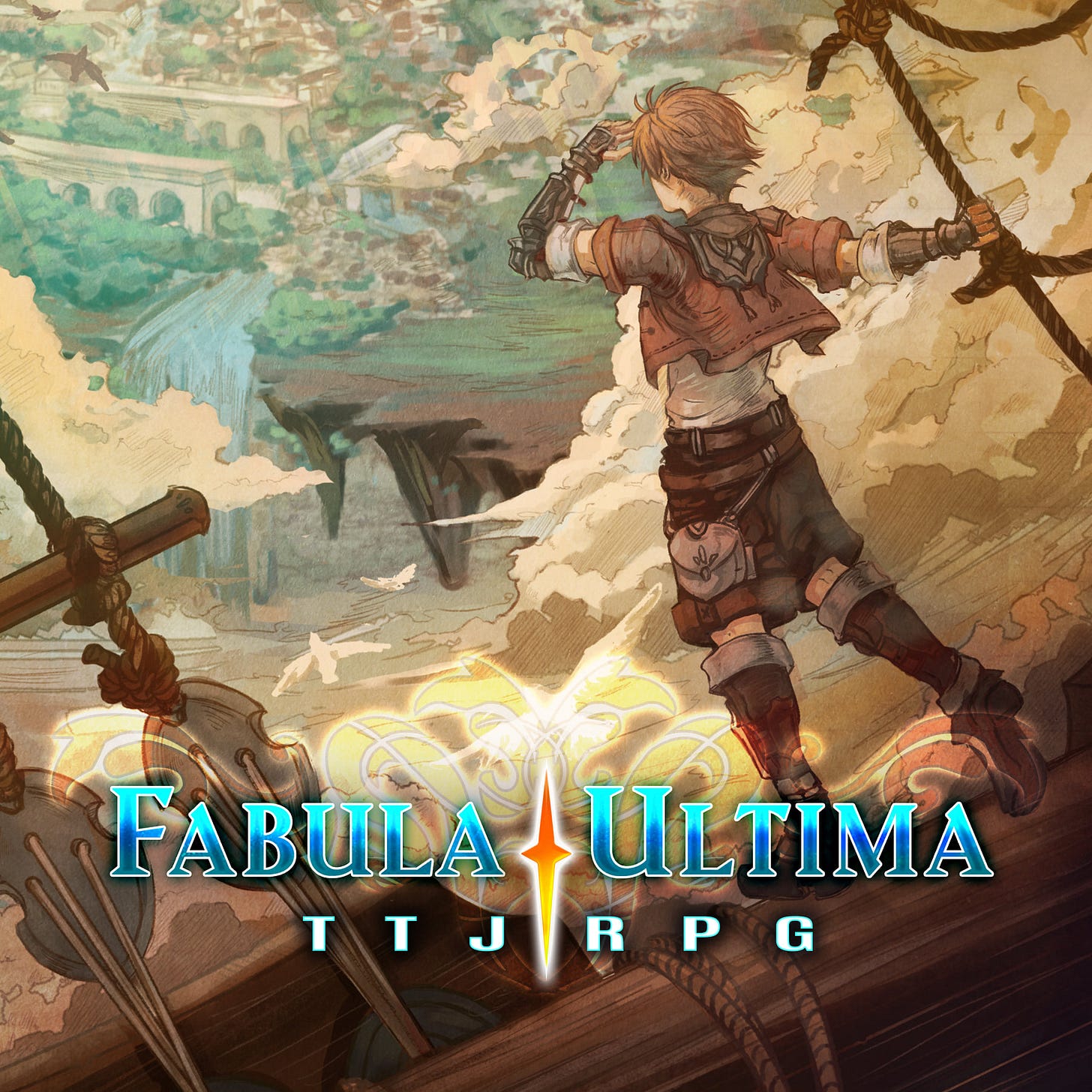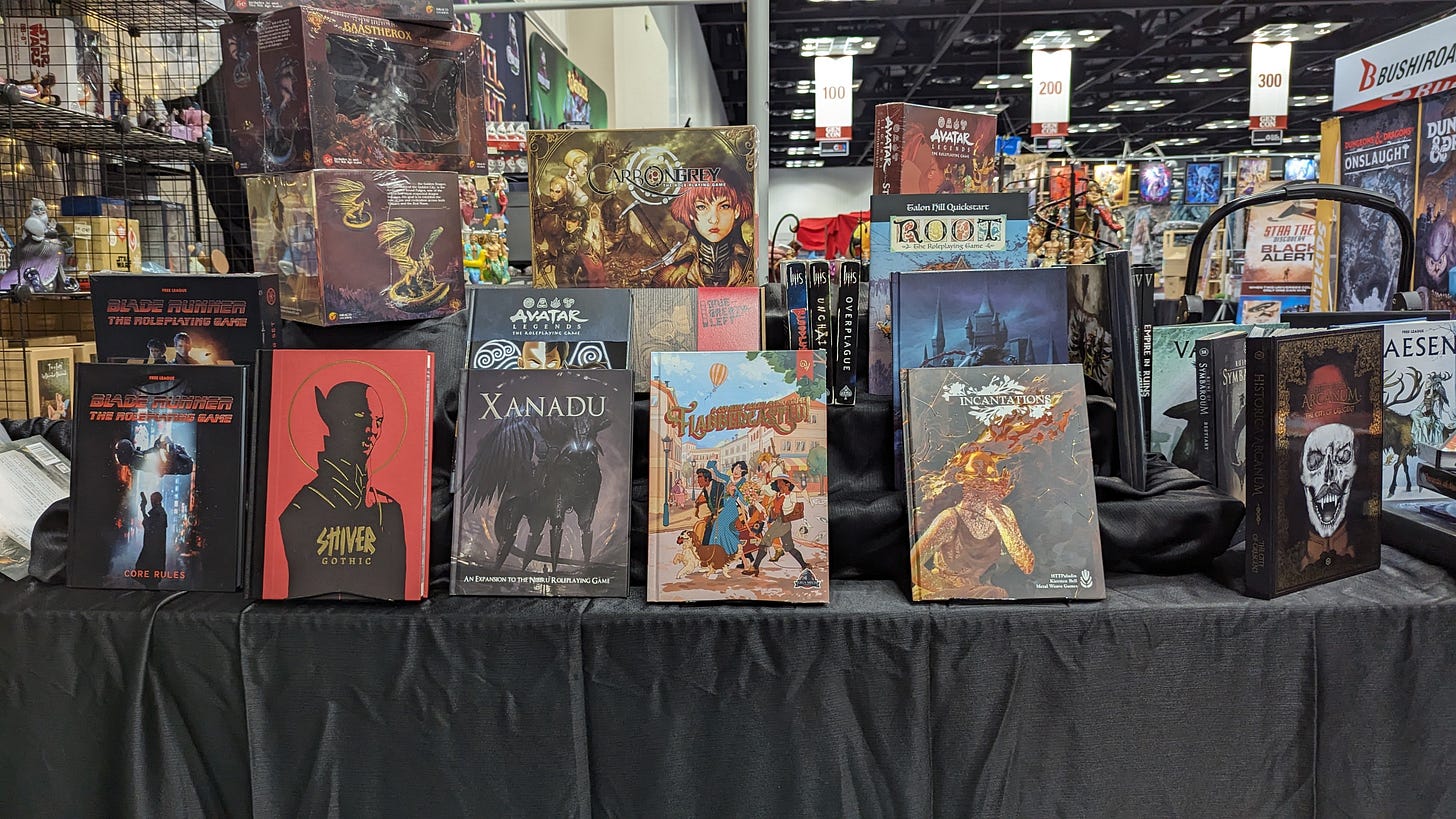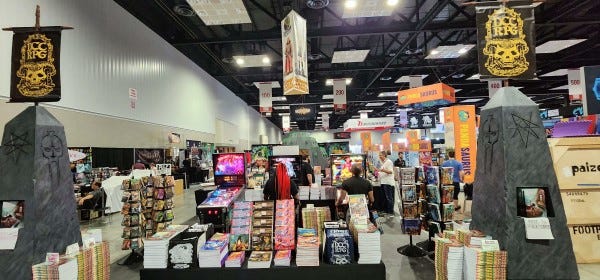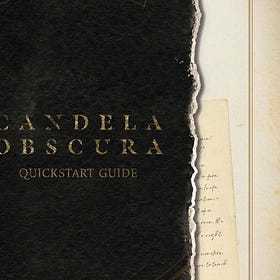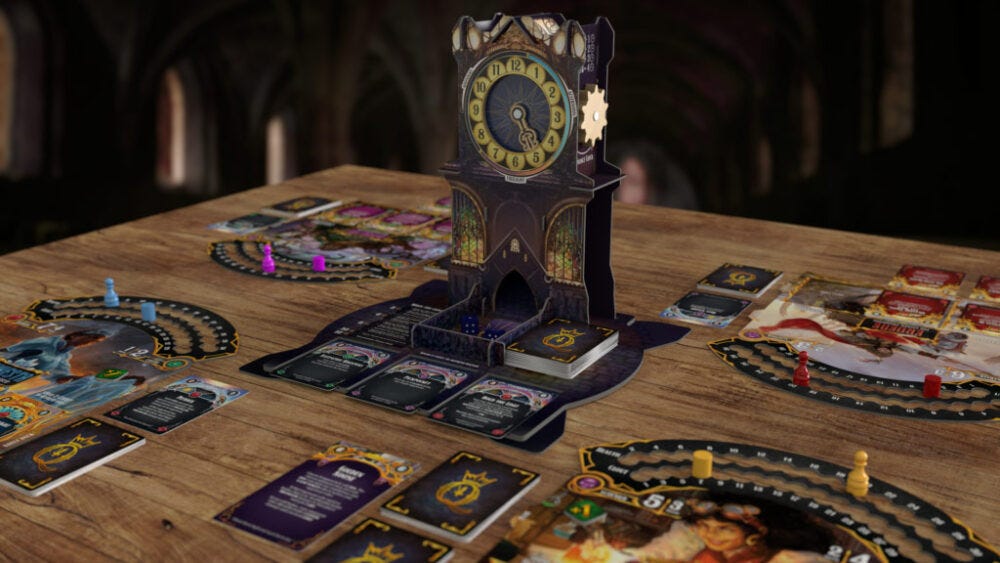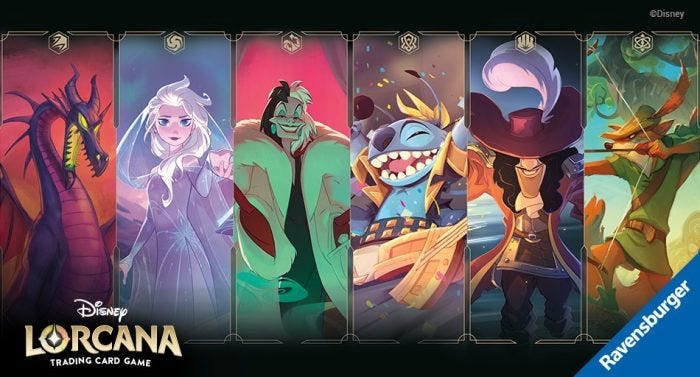1) Know Your Hook! - Imaria: Legacy of Mana
At Gen Con, I visited a number of booths, but one of the more memorable ones belonged to Lynnvander Studios. They were promoting their latest creation, Imaria, a 5th edition D&D-compatible setting. What struck me as I talked with the representative was how challenging it was for him to convey the uniqueness of the new setting.
The market for “5e-compatible” settings is over-saturated, making it crucial for settings to distinguish themselves from the Forgotten Realms, D&D’s native setting, or even people’s own homebrew campaigns. The representative at Lynnvander Studios explained that Imaria takes place in a fallen empire where different factions fight to fill the power vacuum. He mentioned new classes, new spells, and all the other things that one would expect in a D&D setting.
Lingo check: A homebrew campaign is a setting or ruleset that is invented by the players of a particular RPG and does not rely on pre-written material.
My eyes were just beginning to glaze over when I heard the phrase “time wizards,” and I began to pay attention. I asked the representative how time magic worked, and from there we had an engaging discussion about one of the setting’s new classes. Time wizards can use magic to cause objects to age quickly or restore them to a previous state, among other things.
Now THAT is a hook. Time manipulation is a tricky thing to get right (I can just see the players breaking the game world with their interpretations of time spells), so the idea that somebody took a stab at it and possibly succeeded was exciting!
I walked away having learned a valuable lesson about pitching your game: know your hook. When you’re competing with hundreds of other companies, many of them with their own “5e-compatible” settings, you have got to know what makes yours stand out and why somebody should pick yours over theirs.
This was an important lesson to learn as someone who was advertising his own product. I came to Gen Con hoping to get my name and my newsletter into public view, but always faltered when it came time to explain who I was and why my newsletter matters.
Speaking of which: you should subscribe to my newsletter because I offer insight into a broad spectrum of niche entertainment in a way that is approachable and fun. My focus is on games that tell a story, whether on the tabletop, the computer, or in interactive spaces.
Later research shows that Imaria not only has time magic, but psionics (something that has been missing from D&D for many years now), and anti-magic warriors dedicated to eradicating magic completely. That’s really cool! And probably the first thing you should mention when trying to get people’s attention. You can check Imaria: Legacy of Mana here.
2) Awards May Not Mean Sales - Fabula Ultima
I heard about Fabula Ultima, the new TTRPG from NEED GAMES!, exactly once, in a Dicebreaker headline calling it a tabletop version of Final Fantasy, the popular JRPG series. As someone who LOVES the Final Fantasy series, this caught my interest, but I didn’t have time to explore it further. Then, on Gen Con Friday, this game that I had heard next to nothing about won the 2023 golden ENNIE award for “best game” and the silver award for “product of the year.”
Lingo check: JRPG stands for Japanese Roleplaying Game, and specifically refers to video games developed in Japan. They have a long history and are known for character-driven storytelling, imaginative settings, and breathtaking art styles, among other things.
On Saturday, the day after the awards were announced, I headed to the NEED GAMES! booth and was surprised to find no line whatsoever. Despite the crowded trade floor, there was only one other person at the booth, and there were plenty of copies of Fabula Ultima left (though the new supplement, Fabula Ultima Atlas, was sold out).
I talked with one of the two representatives about their award-winning game and tried to figure out what made it so special. NEED GAMES! is an Italian company — an Italian company producing a game in English based on entertainment from Japan — and English was clearly not the representative’s first language, so I believe our discussion was marred a little by the language barrier. It was also day three of the convention, so we were both rather tired. Still, after our conversation I could not say what the game’s selling point was.
The representative explained that the book had rules for character creation and combat, that there were some positional aspects to the combat (front line/back line combat, familiar to players of classic Final Fantasy), and that it was not based on Final Fantasy alone, but on a great many JRPGs.
This was not a great selling point. Most RPGs have character creation and combat mechanics, and a lot of those combat mechanics rely on the positions of characters. None of these explanations screamed “best game of 2023.” I repeat lesson #1: know your hook!
My biggest question was how a game based on video game RPGs translated to tabletop. Despite both being called “RPGs,” video game and tabletop RPGs are very different. Video game RPGs are solo affairs that rely on repetitive mechanics, quick battles, and characters with distinct personalities. Tabletop RPGs rely on multiple players, characters with flexible personality traits, and drawn-out tactical battles (generally). The representative, confused by my questions, had no answers for me, so I decided to buy a copy and study it later.
I have since gathered that the appeal to Fabula Ultima is not in mimicking the mechanics of JRPGs, but in emulating the tropes of JRPG storytelling: young and inexperienced characters in dangerous worlds, building bonds and growing in power until they are often quite literally squaring up against gods. “Killing God with the power of friendship” is a quintessential JRPG trope, and this is the game that can give you that experience with real, flesh-and-blood friends.
If you’re pitching a game, don’t try to sell people on it by telling them about your mechanics or character creation rules. Instead, tell them that they can steal an airship with their motley crew of friends and ram it into the face of God because God is killing the planet, if they play your game. THAT’s a hook!
3) Awards May Mean Exposure - The ENNIE Awards
I still do not know how Fabula Ultima won “Best Game.” I’m not saying it doesn’t deserve it, just that I don’t understand how it ended up in that position. Its competition included games like “Flabbergasted!” and “Trohpy RPG,” other games that I’ve heard of in passing, but know almost nothing about, so it is possible that Fabula Ultima just happened to be the only recognizable name among the list of nominees. It’s also possible that it made a much bigger impact overseas than here in America. If anybody has any insight on this, PLEASE let me know in the comments!
The thing about the ENNIES, like many industry awards, is that it is not an objective mark of quality. ENNIE nominees are chosen by a select group of judges with their own opinions and tastes, and their nominations come from a limited pool of games that can afford to be submitted. Monkey’s Paw Games released a thoughtful article on the cost of submitting a product to the ENNIE awards ($700 Canadian for two games, in their case). In order to be considered, you have to mail physical copies of your work to each of the judges, meaning that indie publishers have a disadvantage over big companies like Wizards of the Coast.
While nominees are chosen by judges, winners are chosen by popular vote. Anybody can vote in the ENNIES, meaning that more recognizable games are inevitably going to earn more votes. This is how games like Avatar: Legends clean house while excellent but niche games like Trophy get left behind (I’ve never read/played Trophy or any of its spinoffs so I can’t attest to its quality, but I’ve heard excellent things about it from other designers).
This is not a knock on the ENNIES or their winners. It’s important to know how the ENNIE award winners are chosen, but as long as those things are understood the ENNIES are a great resource. As someone who is not playing the latest indie titles every week (though I’m working on it), I find the ENNIES are a great way of discovering RPGs that I have never heard of before. I had never heard of the Book of New Jerusalem before, but now I am excited by its blend of novel and TTRPG resource. I had heard of Fabula Ultima and Vaesen before, but it wasn’t until they received ENNIE nominations that I started to take them seriously, and now they are much higher on my list of games to check out.
So if my anecdotal evidence about the NEED GAMES! booth suggests that awards don’t equal sales, then my anecdotal evidence also suggests that awards do serve to give quality niche titles more exposure. Does that seem kind of contradictory? Maybe. Do I have any data supporting either claim? No!
4) Be Inviting - Goodman Games
After running five games of Dungeon Crawl Classics (DCC) for Goodman Games, it has become clear that it is one of my favorite RPGs right now and I should dedicate an entire article to it and Goodman Games’ excellent marketing strategies at some point.
Suffice it to say, they are dominating their old-school gaming niche. Goodman Games are nostalgic without being hung-up on “the good old days.” Unlike modern nostalgia traps like Stranger Things and Ready Player One, media that seem to grab you by the shoulders and yell “Hey! Remember this thing!? You liked this thing in the 80s! That means you should like us too!” Goodman Games just gives you a friendly nod and asks: “hey man, want to play pinball?”
That’s not a metaphor, Goodman Games had actual pinball machines at their booth that you could play for free. They also had racks of pulp fantasy novels, the kind that inspired the wacky adventures of early D&D and Dungeon Crawl Classics. They stored their wares in a ziggurat and hosted DCC games in a shag-carpeted van. Goodman Games are all about inviting you into the chill world of the 1980s, whether you were there or not. It’s not a club for old people stubbornly clinging to their childhoods, it’s an honest and open celebration of the things that made the late 20th century fun for the adults who lived it. And I think that’s cool.
5) Exclusivity Drives Demand - Darrington Press
I’ve spoken before about my interest in the upcoming output of Darrington Press, the game-publishing wing of popular web series Critical Role, and how I think their upcoming game, Candela Obscura, could serve as a sea-change for the TTRPG industry as a whole.
Candela Obscura May Light the Way For New Players
A Shifting Landscape In the lead-up to next month’s Gen Con, the premier gaming event of the year, the tabletop RPG industry is poised for massive changes. After a Covid-induced hiatus in 2020, the convention has been slowly returning to pre-pandemic levels, reaching
My quest was to snag an early copy of Queen by Midnight, their upcoming deck-building game about warrior princesses fighting for the right to the crown. Its most prominent feature is its cardboard clock tower, which doubles as a dice tower and is probably the biggest contributor to its $70 price tag. I gave that quest up pretty quickly after they sold out within 49 minutes on the first day. They had fewer and fewer copies each following day, meaning that it sold out faster and faster. Given that the game is coming out tomorrow (8/22), and I would not have had a chance to play it earlier anyway, it’s just as well, but I (like many others) thought it would be fun to get a copy two weeks early. I could have written an early review of it, I suppose, but that will have to wait for the full release.
I found it strange that they insisted on spotlighting this one product at Gen Con. It’s fun to get games ahead of release, but they had nothing else for sale at their booth, only a few advertisements for their upcoming games. There were no major updates about Candela Obscura or Daggerheart, their upcoming RPG systems, and the game I really wanted, Til the Last Gasp - a 1v1 game about warriors dueling to the death in a dramatic final struggle - was not available either.
While they did have playtests of both Candela Obscura and Daggerheart, I was unable to try either. Event tickets sold out within minutes of becoming available, and I had to run my own games. Candela Obscura has a freely available quickstart, so playing at the con wasn’t necessary (though try getting a game going online, tell me how that goes), but Daggerheart would have been a real treat. So far, only those lucky handful of con-goers know anything about this elusive game.
The only other thing to be gained from Darrington Press was their set of Candela Obscura dice, which included nine d6s with the Candela Obscura logo on them, three of them in a different color to represent the game’s “gilded” dice. These were on my wishlist and I certainly did not expect to get them for free, if at all. This was an incredible deal (dice are expensive, after all) and I couldn’t fathom why they waited until Sunday to start passing them out.
The biggest impact Darrington Press had on Gen Con was the massive line that blocked traffic in a significant portion of the con (though not half as bad as Disney’s Lorcana, my god). While inconvenient, this line probably did more to increase their visibility than anything else. With a limited stock and exclusive deal, they were able to generate buzz and advertise their wares without having to carry a very large stock.
6) When Disney and Trading Card Games are Involved, Bring a Weapon* - Lorcana
I’ve already mentioned the madness that was the line for Disney’s Lorcana trading card game (TCG). The line was LITERALLY out the door and onto the street. I didn’t even know about the shoving and name calling until after the con. It shouldn’t have been a surprise. Disney merchandise sells, and so do trading card games. It’s actually kind of ridiculous how TCGs are treated these days.
There was another story about a heist that occurred just the day before I arrived at Gen Con. Two men walked off with an entire pallet of trading cards (not just Lorcana, but also Pokemon and Magic: The Gathering cards as well) worth hundreds of thousands of dollars. It was baffling as it was bold.
I’m not sure what kind of people would stand in line for the better part of a day (or even overnight in some cases!) for a box of trading cards, but I assume many of them were scalpers looking to re-sell them for obscene prices and parents who are maybe a little TOO eager to please their progeny. As much as I scoff at the kind of people who would do this sort of thing, I have to respect the game. Standing in a line for an entire day just to get what you want is certainly bold.
In any case, if you’re looking to get your hands on some Lorcana cards, maybe bring something to defend yourself with. Demand is high and the danger is real.






